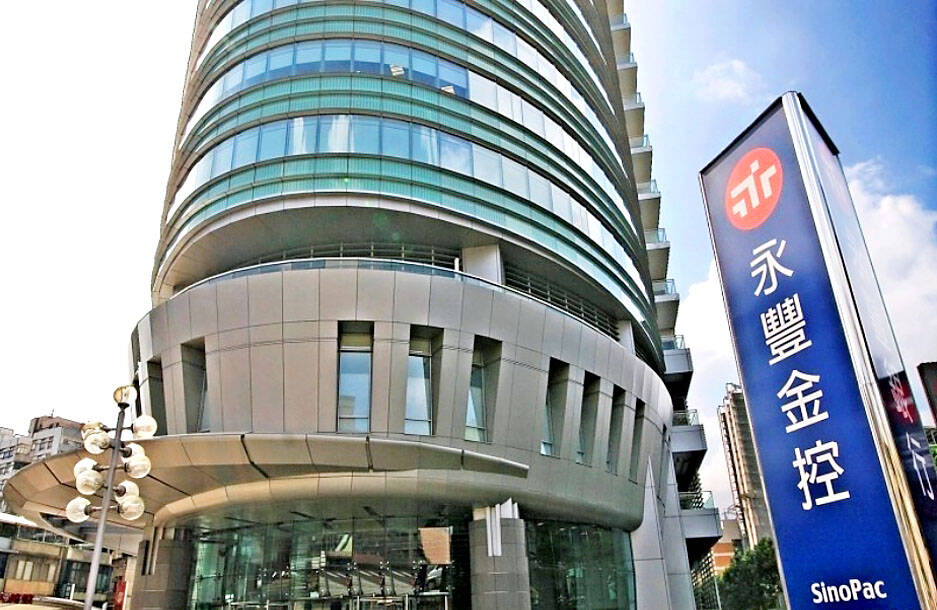The Financial Supervisory Commission (FSC) yesterday fined SinoPac Financial Holdings Co (永豐金控) NT$10 million (US$308,356) and cut its chairperson’s salary over poor internal controls and failure to comply with corporate governance requirements.
The company’s management team was found to have invited major shareholder and former chairman Ho Shou-chuan (何壽川) to attend two meetings about its medium and long-term strategic planning in August and September 2021, Banking Bureau Deputy Director-General Phil Tong (童政彰) said.
During the meetings, Ho was briefed by executives of the company and its subsidiaries about their business plans, Tong said, citing a routine commission inspection of SinoPac Financial.

Photo: Kelson Wang, Taipei Times
No reports or meeting documents were kept, he added.
Ho stepped down as chairman at SinoPac Financial in June 2017 after the company was found to have engaged in a series of loans via its banking and leasing units without adequate collateral and documentation.
Being a founder of SinoPac Financial, Ho still owns a substantial stake in the company, but he should receive information from his representatives on the board, rather than directly from management, as he is no longer in charge of the company, the commission said.
“The company has three major deficiencies: poor corporate governance, a lack of internal controls and failure to properly manage subsidiaries,” Tong said.
The commission also cut SinoPac Financial chairwoman Chen Shi-kuan’s (陳思寬) salary by 30 percent for six months for her failure to supervise the company, and imposed the same salary cut on Liao Shun-hsin (廖順興), head of the company’s legal department, for three months for contravening corporate governance requirements, it said.
The commission since last year has fined Shin Kong Financial Holding Co (新光金控), China Development Financial Holding Corp (中華開發金控) and CTBC Financial Holding Co (中信金控) NT$20 million to NT$40 million after their major shareholders were found to have improperly intervened in company operations.
To help stop major shareholders from improperly interfering in the operations of financial holding companies and banks, the commission this month submitted proposed amendments to the Financial Holding Company Act (金融控股公司法) and the Banking Act (銀行法) to the Executive Yuan for review, hoping the draft legislation would be deliberated in the legislature as soon as possible.
However, the commission has watered down penalties in its proposal, saying it hopes the legislation would advance smoothly and achieve its policy goals in stages.
Some have asked whether there is external pressure ahead of January’s presidential and legislative elections, but FSC Chairman Thomas Huang (黃天牧) denied there was any such factor at play at a meeting of the Legislative Yuan’s Finance Committee yesterday.

Taiwan Semiconductor Manufacturing Co (TSMC, 台積電) would not produce its most advanced technologies in the US next year, Minister of Economic Affairs J.W. Kuo (郭智輝) said yesterday. Kuo made the comment during an appearance at the legislature, hours after the chipmaker announced that it would invest an additional US$100 billion to expand its manufacturing operations in the US. Asked by Taiwan People’s Party Legislator-at-large Chang Chi-kai (張啟楷) if TSMC would allow its most advanced technologies, the yet-to-be-released 2-nanometer and 1.6-nanometer processes, to go to the US in the near term, Kuo denied it. TSMC recently opened its first US factory, which produces 4-nanometer

GREAT SUCCESS: Republican Senator Todd Young expressed surprise at Trump’s comments and said he expects the administration to keep the program running US lawmakers who helped secure billions of dollars in subsidies for domestic semiconductor manufacturing rejected US President Donald Trump’s call to revoke the 2022 CHIPS and Science Act, signaling that any repeal effort in the US Congress would fall short. US Senate Minority Leader Chuck Schumer, who negotiated the law, on Wednesday said that Trump’s demand would fail, while a top Republican proponent, US Senator Todd Young, expressed surprise at the president’s comments and said he expects the administration to keep the program running. The CHIPS Act is “essential for America leading the world in tech, leading the world in AI [artificial

REACTIONS: While most analysts were positive about TSMC’s investment, one said the US expansion could disrupt the company’s supply-demand balance Taiwan Semiconductor Manufacturing Co’s (TSMC, 台積電) new US$100 billion investment in the US would exert a positive effect on the chipmaker’s revenue in the medium term on the back of booming artificial intelligence (AI) chip demand from US chip designers, an International Data Corp (IDC) analyst said yesterday. “This is good for TSMC in terms of business expansion, as its major clients for advanced chips are US chip designers,” IDC senior semiconductor research manager Galen Zeng (曾冠瑋) said by telephone yesterday. “Besides, those US companies all consider supply chain resilience a business imperative,” Zeng said. That meant local supply would

Servers that might contain artificial intelligence (AI)-powering Nvidia Corp chips shipped from the US to Singapore ended up in Malaysia, but their actual final destination remains a mystery, Singaporean Minister for Home Affairs and Law K Shanmugam said yesterday. The US is cracking down on exports of advanced semiconductors to China, seeking to retain a competitive edge over the technology. However, Bloomberg News reported in late January that US officials were probing whether Chinese AI firm DeepSeek (深度求索) bought advanced Nvidia semiconductors through third parties in Singapore, skirting Washington’s restrictions. Shanmugam said the route of the chips emerged in the course of an